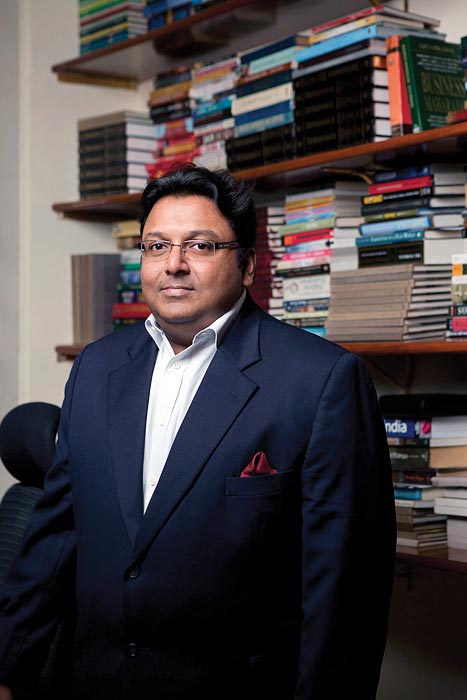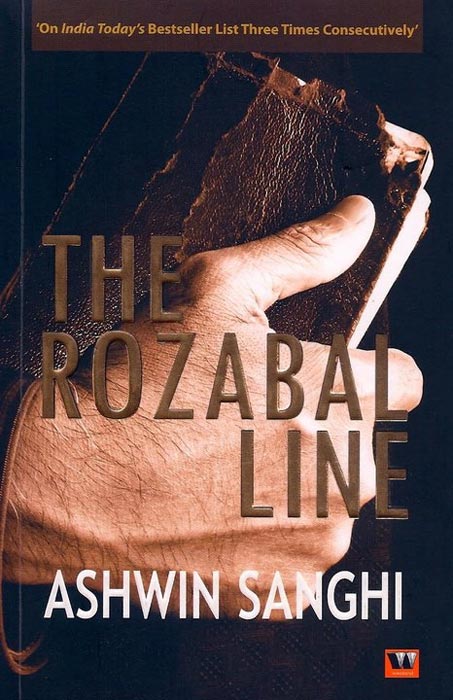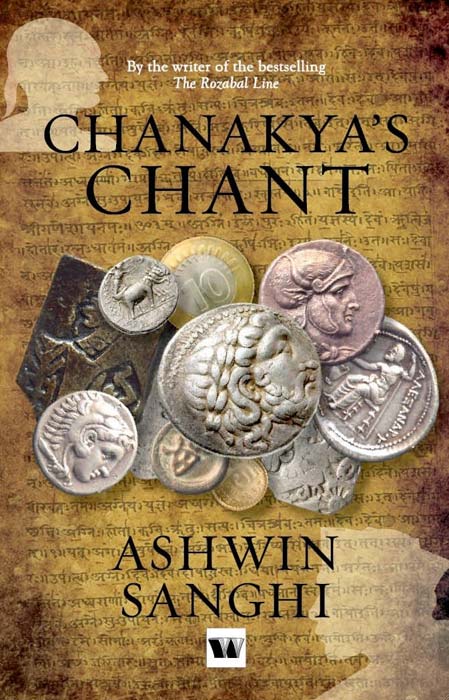
In the first part of an exclusive interview, Ashwin Sanghi told Rediff.com's Divya Nair about his fascination with Krishna.
Sanghi who hails from an affluent business family, discovered early on in his life that besides being pretty good with numbers, he also had a thing for history and a fascination for the world beyond the realm of excel sheets and sales figures.
So just who triggered his interest in the written word? Read on!
Your parents moved to Mumbai when you were young. What are your fondest childhood memories?
My childhood was uneventful. In 1961, my parents shifted from my dad's hometown in Jodhpur and returned to Mumbai. I was born in 1969, the youngest of three.
Although we never lacked the essentials, we were all kept on a tight leash.
I still remember the crisp one rupee note that would be left at the breakfast table in the mornings. It was the day's pocket money!
Those were simpler times. We would be excited by a new comic or a softy ice cream cone! The only channel on TV was the black-and-white Doordarshan that appeared for two hours in the evening and I still remember the anticipation with which we would wait for the Sunday evening movie to start.
Each year, my family would travel back to my dad's hometown -- Jodhpur -- during Diwali where the extended family would assemble at our ancestral home.
Those were incredibly exciting days because the house was a sprawling haveli with cows and horses.
Please click NEXT to continue reading...

Tell us a little about your time at Yale. How did foreign education contribute to your world view?
Yale was one of the best things that happened to me. The School of Management had one library but the university had over 20 libraries all over the campus. It was manna from heaven for anyone who loved books.
The other great thing about Yale was that you could sit in on virtually any class across the campus irrespective of which college or professional school you were part of.
I found myself quite often in history, drama or philosophy lectures even though I was completing an MBA in Finance.
Besides, more than a third of the class at Yale was international. The male-female ratio was 50:50. Around a quarter of the class consisted of people from not-for-profit organisations, public sector entities, government departments, charities and international agencies.
The mix at Yale was such that you could not say anything that would not result in a vigorous debate. So, one learnt to be prepared for a spirited discussion, always.
The years that I spent in the US were also the times of change. For instance, 1991 was the year when the first Gulf War was launched by George Bush Sr in response to Saddam Hussain's invasion of Kuwait and in 1992, Bill Clinton was elected President.
The campus was buzzing with political discussions and that's when I realised that there isn't one single truth ever, there are multiple truths. Which truth you believe in, depends upon your own background and perspective.
Tell us about your first exposure to entrepreneurship. How did you come about joining the family business?
At the age of 12, I would go to my dad's office to be taught book keeping and accounting. That was my first exposure to entrepreneurship. When I was 16, pursuing my first year of junior college, I started working almost fulltime alongside him.
With the exception of the two years that I spent completing my MBA, it was taken for granted that I would come back and join the firm.
My grandfather, Motilal Sanghi had started the business from Jodhpur in the 1920s. As years passed, different branches of the family went their own ways. So, by the time that I entered the business, my father was independent.
Our business was Mumbai-centric and we had interests in automobile dealerships, industrial gas factories, plant and equipment engineering and real estate. Initially when I returned from the US, I was sent to one of our industrial gas facilities for training.
After a couple of years, I shifted to the automobile business.
A few years later I moved into real estate. I have spent over 25 years in the family business and today though I have no direct operational responsibilities I continue to put in a forty-hour week at work.

How did writing come about in all of this?
I was always fond of reading, not writing. When I was 11 or 12, my maternal grandfather who used to live in Kanpur would send me a book every week from his library.
From (Leo) Tolstoy to (Charles) Dickens and erotica like Fanny Hill and consolidated works of William Shakespeare, I was supplied with all kinds of books to read.
Looking back, I have more than 400 books gifted by him. What started at the age of 12, continued till I was 23. My grandfather's only condition was that I had to send him a letter every week telling him how I liked the book. That's how I got hooked to reading. But I never thought I would write a book.
When I came back from the United States after completing my MBA, I was approached by Cosmopolitan to write a column on the relationship between men and women.
It was the first time I was asked to write something beyond the business domain, which many newspapers otherwise wanted me to write on. I wrote this column under a pseudonym and for the first time, I realised how comfortable I was at writing it. That's when I decided to take to writing for pleasure.
Few years later, when work got the better of me, I had taken a break from work and visited the Rozabal shrine in Kashmir. That's when I wrote a few 5000 words that went on to become the first draft of The Rozabal Line.
Why did you write The Rozabal Line under a pseudonym (Shawn Haigins)?
Since it was my first work as a writer, I thought it would be easier to have a Shawn Haigins in the front. So that he can take all the flak for the book.
When I took to writing in 2004-05, I realised that I had a strong identity as a businessman. If someone searched for me on Google, they'd end up finding Ashwin Sanghi, the entrepreneur. So, I created a separate identity -- that of Shawn Haggins, the author.
But when Westland republished it in India, they wanted to use my name with the book. Since the book dealt with theological material, they wanted me to be there to defend the material.
Why did you self publish your first book? What were the challenges you faced as a struggling writer?
After I had finished writing The Rozabal Line in 2006, I wrote to several publishers. I must have sent over 100 requests to literary agents and publishers between India and abroad. That's when the rejections started coming in. Surprisingly, the rejections weren't many, because very few agents reply to your emails.
Those few who replied gave me suggestions like: This book is not right for us. Someone said that the story is too complicated, so are the timelines and chronology.
Only one of the literary agents sent me a rather long email with a set of pointers on what I must do to my book before I came back to him again. That was the first time, I realised that the genre of fiction I was dealing with had to be tackled in a certain way so that it immerses the audience.
I also received some obnoxious comments like: 'Your material was good. But I wish it had stopped on page 10.'
It was my first experience with creativity and it was turning out to be unsuccessful. That's when I began to appreciate creative writing.
A year and a half passed by since I finished my first draft and no one had picked up the rights to my book.
I approached Lulu.com at a stage when self publishing was at a rather nascent stage. I created my own cover and the book went up on Amazon for sale.
I promoted the book aggressively -- I distributed it among my friends and bloggers for free. In return, I asked them to write a review on their blog or Amazon. I was desperate for some activity around the book. To an extent, that helped because in those few months, I succeeded in getting a considerable amount of visibility for the book.

Historical fiction seems to be a new trend that's catching up in India. Why would you say people are taking to such subjects?
We live in a fast-paced world where reading is a luxury that not many can afford. Whatever treasure of knowledge we have of the past is in the form of volumes which are bulky to carry and demand too much patience.
The young generation wants to read something on-the-go. Although the hunger for knowledge and information is there, they don't like preachy stuff.
They want something that is racy, contemporary and set in the modern times. They like to read books which intrigue them to think beyond what's already given. It has to be intelligent enough to hold their attention.
What are the common blunders Indian authors make that you wish they could avoid?
I won't call them blunders, but I personally believe that publishers these days are pushing the envelope a tad too far. I wish they invested a little more time and effort into developing the new crop of talent and nurture them instead of publishing their work as is.
What were the mistakes you made as a debut writer that you rectified later?
Somerset Maugham was famously quoted as saying that there are three rules for writing a novel and that no one knows what they are! That was pretty much my situation when I set out to write The Rozabal Line.
I had lots of research material but I did not invest adequate time in plotting and planning the story. The result was that book had to be rewritten and edited several times over.
The one book you wish you'd written and why?
It has to be The Rubaiyat of Omar Khayyam. My grandfather had presented me with a 1951 leather-bound edition of the Fitzgerald translation and I have read it several times over.
Most of my writing is from the brain -- intense research, plotting, planning and executing. But this work of poetry is entirely from the heart. I would love to write like that -- with complete abandon and utter submission to the divine -- one day.
What are your greatest learnings from life?
Be good to others, whenever you can.
Don't be evil. Remember that the world is karmic.
Take each day as it comes -- try to live in the present moment.
Laugh as much as possible.
Find your passion and make that your life.
Don't compromise on family time or health.
Friends are more precious than wealth.
Money only gives you the freedom of not having to worry about it.
Lakshmi without Saraswati is useless.
Humility always pays off in the long run.
Please share some tips for aspiring authors who are unable to find a publisher.
Rejection is part of the process of getting published. Whenever you feel dejected, just remember that Jonathan Livingston Seagull (by Richard Bach) was rejected 140 times, Gone With The Wind (by Margaret Mitchell) was rejected 38 times, Stephen King's Carrie was rejected 30 times and JK Rowling's Harry Potter was rejected 12 times.
The answer is to keep tapping into publishers and literary agents until you strike a deal.
These days, self-publishing via various ebook platforms is also a serious alternative.
Do you have a message/advice for our readers?
Strength is not about lifting weights in the gym. It's about lifting yourself up when you are knocked down by life.